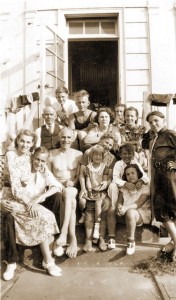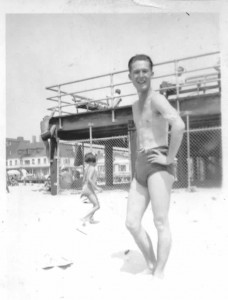1931: My first day in the first grade of P.S. 214 began with me being escorted there by Dad. We walked the four blocks to school and Dad left me sitting on a bench in the first floor basement and then went on to work. I was very early and the first student to arrive. After about 15 minutes of nervous anticipation, others began to show up and I discovered that students were to line up outside in the schoolyard. I joined the crowd of first graders there and waited with a great deal of apprehension for my schooling to begin.
How to evaluate my eight years of schooling at P.S. 214?
I have the feeling that it was a positive learning experience. But then there was Mrs. Norris.
She was our second grade teacher and a very busy person. She distributed the penny milk to those kids who ate lunch in her classroom, presided over the detention room and offered various programs of arts and crafts for different grade levels. I can remember bringing a bar of Ivory Soap to her class and trying unsuccessfully over a period of weeks to carve it into the shape of the Empire State Building.
And then there was her sewing class…
The challenge was to make a pink pillow in the shape of a pig. Mrs. Norris handed out all the necessary supplies such as scissors, the pattern to cut the cloth, the cotton for the stuffing and the needle and thread to sew the two sides of the pig together. All went well until the time came for me to stitch the pig’s sides together. A large knot had developed in my thread and I couldn’t untie it so I could not proceed with my sewing.
Mrs. Norris’ system for helping students with problems was to have the unlucky ones come up to her desk by rows. Since we were seated alphabetically, “H” put me in the second seat of the fourth of six rows. Sometimes the busy Mrs. Norris would start with the first row and ask if they needed help. Once in a while she’d start from the sixth row. There I was seated in the middle and she never got to my row one way or the other. Whenever I raised my hand and asked for help she would tell me that I would have to wait my turn. The class met once a week for six weeks and when we handed in our pigs for grading, Mrs. Morris wanted to know why I had not asked for help. I told her she had never gotten to my row and she gave me a D in sewing.
The dreaded Grade D monster raised its head one more time. And that was for a class in Integral Calculus I was taking at NYU the summer of 1943. Wayne Umland and I were both taking the course and he asked if I would tutor him daily at lunchtime just before the class went into session because he didn’t have a clue as to what was going on. So each day we’d pick a nice bench in Washington Square Park and review the upcoming lesson. Seemed to work pretty well and Wayne was catching on. Just how well is the knot of the story. Our grades were based on a single test at the end of the semester and the grade on the test was the grade for the course. My student came up with a B. His tutor – er, me – screwed up the test and I got the second D of my scholastic lifetime.
There were other incidents along the way at P.S. 214 that come to mind that have nothing to do with the quality of the teaching, but reflect upon the by-play experienced by most school kids. First of all, I was a good student and didn’t horse around like the other guys when the teacher was out of the room. Among others, this got Robbie Naylor mad at me and every chance he got he’d play the bully – step on my foot or body-bunk me – just looking to get a rise out of me. The fact that I was I was one of the smallest guys in the class increased his bravado.
Finally, one day, to his complete surprise, I whacked him back and then heard the dreaded words shouted for all in the hallway to hear, “Meetcha outside in the schoolyard at three o’clock.” My heart sank. I had never fought anybody. The word quickly spread that Hoppe and Naylor were going to fight. An interested crowd gathered, but was disappointed when nothing much happened other than some aimless sparring. Naylor was needled by the crowd as I turned away and started my walk home down Forbell Avenue. He ran up to challenge me again and took a poke at me. Fired by an adrenalin rush, I ran at him, tackled him and got on top ready to get more than even when Naylor yelled out, “Not fair. Not fair. We’re supposed to box, not wrestle.” I didn’t know that there were rules we were supposed to be fighting by, so I let him up out of some misguided sense of fairness. We started boxing, but again I wrestled him down to the ground, sat on him and in a fury demanded he say, “Uncle,” which he did much to my surprise and I let him up again. The only fight I ever had in school was over and I had humbled my opponent in front of about 40 classmates. Felice Kaplan and Mildred Fahrent walked with me as far as Liberty Avenue. What a wonderful feeling!


